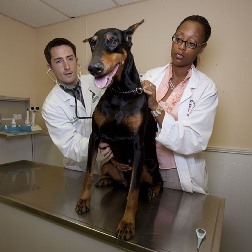How to Pick a Veterinary Assistant School in Wisconsin
 Achieving your lifelong goal of working with and helping pets by enrolling in a veterinary program in Wisconsin could at first seem like an overwhelming undertaking. After all, you need to find and enroll in a college that will provide the appropriate training so that you can be successful as a veterinary assistant, technician or technologist. But just how do you tackle analyzing and comparing programs so that you can make the proper choice? Many future students start their due diligence process by searching for campuses that are near their homes. When they have identified some nearby colleges, they determine which ones have the lowest tuition and hone in on those. Although expense and location are significant factors when evaluating vet tech schools, they are by no means the only critical ones when making your assessments. Qualifiers such as internship programs and accreditation should be considered as well. The main idea is that there are questions you ought to be asking the veterinary tech programs you are looking at before you make a final selection. We have presented several within this article in order to help get you started, but before we discuss them we’ll go over the various responsibilities of vet techs and assistants and the training options offered.
Achieving your lifelong goal of working with and helping pets by enrolling in a veterinary program in Wisconsin could at first seem like an overwhelming undertaking. After all, you need to find and enroll in a college that will provide the appropriate training so that you can be successful as a veterinary assistant, technician or technologist. But just how do you tackle analyzing and comparing programs so that you can make the proper choice? Many future students start their due diligence process by searching for campuses that are near their homes. When they have identified some nearby colleges, they determine which ones have the lowest tuition and hone in on those. Although expense and location are significant factors when evaluating vet tech schools, they are by no means the only critical ones when making your assessments. Qualifiers such as internship programs and accreditation should be considered as well. The main idea is that there are questions you ought to be asking the veterinary tech programs you are looking at before you make a final selection. We have presented several within this article in order to help get you started, but before we discuss them we’ll go over the various responsibilities of vet techs and assistants and the training options offered.
The Responsibilities of a Vet Technician and Assistant
 Among the initial decisions that you will need to make is if you wish to train as a veterinary assistant, technologist or technician. Part of your decision might be predicated on the amount of time and money that you have to devote to your education, but the primary determiner will undoubtedly be which specialty appeals to you the most. What vet techs and assistants have in common is that they all work under the direct supervision of a licensed and practicing veterinarian. And although there are a number of functions that they can perform within the Wisconsin veterinary clinic or hospital, they can’t prescribe drugs, diagnose health issues, or conduct surgeries. In those areas they can only furnish support to a licensed veterinarian. There are technologists and technicians that work away from the standard veterinarian practice, such as for animal shelters, zoos or law enforcement. Let’s take a look at the duties and training prerequisites for each position.
Among the initial decisions that you will need to make is if you wish to train as a veterinary assistant, technologist or technician. Part of your decision might be predicated on the amount of time and money that you have to devote to your education, but the primary determiner will undoubtedly be which specialty appeals to you the most. What vet techs and assistants have in common is that they all work under the direct supervision of a licensed and practicing veterinarian. And although there are a number of functions that they can perform within the Wisconsin veterinary clinic or hospital, they can’t prescribe drugs, diagnose health issues, or conduct surgeries. In those areas they can only furnish support to a licensed veterinarian. There are technologists and technicians that work away from the standard veterinarian practice, such as for animal shelters, zoos or law enforcement. Let’s take a look at the duties and training prerequisites for each position.
- Vet Assistants in most instances will have gone through a structured training program, either as an apprentice or intern in a vet clinic or hospital, or by completing a certificate program at a vocational school or community college in Wisconsin. As the name implies, their job function is to assist the vets and vet technicians in the completion of their duties. Generally they are not associated with more complicated activities, for instance assisting with surgical procedures. A few of their usual duties may include working at the front desk, cleaning and preparing examination rooms and equipment, or handling pets during exams.
- Vet Technicians get more advanced training compared to assistants and normally obtain a two year Associate Degree, ideally from an American Veterinary Medical Association (AVMA) accredited program. They are in a sense the vet equivalent of medical nurses, since their general job duty is to assist vets with diagnosing and treating animal patients. Where they differ from veterinary assistants is that they are included in more complicated tasks, for instance assisting with surgical procedures or administering medicine. All states currently mandate that vet techs pass a credentialing examination for either certification, registration or licensing.
- Vet Technologists are similar to vet techs and basically carry out the same job functions. They are mandated to obtain a Bachelor’s Degree in veterinary technology, which usually requires four years to complete. So the main distinction between a vet technician and a technologist is the technologist’s higher level of education. But with an advanced degree comes more career opportunities, higher salaries and possible management positions. They are also required to pass a credentialing exam for either certification, registration or licensing.
Veterinary techs and technologists can specialize in areas such as internal medicine, anesthesia or emergency care. A number may acquire certification from the American Association for Laboratory Animal Science (AALAS) to work in labs or Wisconsin research facilities as well.
Online Veterinarian Training Classes
 An approach that may be a solution for those with a hectic schedule or who are working full-time while going to veterinarian college is to enroll in an online program. Because the classes are provided via the internet, students can study on their own schedule wherever a computer is available. The curriculum is taught using several methods, including slide shows, videos and live streaming webinars. And since many vet technician and technologist degrees require clinical training, that segment can typically be completed as an internship or work study program at a local Wisconsin veterinarian clinic or hospital. Distance learning, as it is also called, can in some instances decrease the cost of your education. Tuition and secondary expenses, for instance for commuting and study materials, can be cheaper compared to more standard classroom courses. Just make certain that the online school that you choose is accredited, either by the AVMA or another nationally recognized accrediting organization. With the online classes and the practical training, everything is furnished for a comprehensive education. So if you are disciplined enough to learn in this more self-reliant manner, an online veterinary tech or assistant program may be the ideal option for you.
An approach that may be a solution for those with a hectic schedule or who are working full-time while going to veterinarian college is to enroll in an online program. Because the classes are provided via the internet, students can study on their own schedule wherever a computer is available. The curriculum is taught using several methods, including slide shows, videos and live streaming webinars. And since many vet technician and technologist degrees require clinical training, that segment can typically be completed as an internship or work study program at a local Wisconsin veterinarian clinic or hospital. Distance learning, as it is also called, can in some instances decrease the cost of your education. Tuition and secondary expenses, for instance for commuting and study materials, can be cheaper compared to more standard classroom courses. Just make certain that the online school that you choose is accredited, either by the AVMA or another nationally recognized accrediting organization. With the online classes and the practical training, everything is furnished for a comprehensive education. So if you are disciplined enough to learn in this more self-reliant manner, an online veterinary tech or assistant program may be the ideal option for you.
Questions to Ask Vet Assistant and Technologist Degree Programs
 By now you should have determined which veterinary certificate or degree that you would like to attain, and if you prefer to study online or attend a college on campus. Since there are a large number of veterinarian community colleges, technical and vocational schools in Wisconsin and across the USA, you need to ask some relevant questions to help narrow down your list of options. As we mentioned in our introduction, many potential students start by prioritizing location and the cost of tuition. But we have previously touched on other important qualifiers, for example accreditation and internship programs. And obviously you need to choose a school that offers the degree and specialty that you are interested in. These and other qualifications are addressed in the checklist of questions that you should ask the vet assistant and tech programs that you are considering.
By now you should have determined which veterinary certificate or degree that you would like to attain, and if you prefer to study online or attend a college on campus. Since there are a large number of veterinarian community colleges, technical and vocational schools in Wisconsin and across the USA, you need to ask some relevant questions to help narrow down your list of options. As we mentioned in our introduction, many potential students start by prioritizing location and the cost of tuition. But we have previously touched on other important qualifiers, for example accreditation and internship programs. And obviously you need to choose a school that offers the degree and specialty that you are interested in. These and other qualifications are addressed in the checklist of questions that you should ask the vet assistant and tech programs that you are considering.
Is the Veterinary School Accredited? It’s important that you make sure that the vet assistant or technician program you choose is accredited by a regional or national accrediting organization. As earlier discussed, among the most highly respected is the American Veterinary Medical Association (AVMA). Vocational schools and colleges that are accredited by the AVMA have undergone a rigorous screening process that verifies you will receive a quality education. Also, accreditation is essential if you are requesting a student loan or financial aid, since a large number of programs are not offered for non-accredited programs. And finally, having a degree or certificate from an accredited program is often a precondition for employment for a number of Wisconsin veterinarian clinics and hospitals.
What is the College’s Reputation? The veterinary vocational school or college and program you select must have an excellent reputation within the vet community. You can initiate your due diligence by asking the colleges you are reviewing for endorsements from the employers in their job placement network. Other tips include looking on online school ranking websites and checking with the school’s accrediting organizations as well. You can ask the Wisconsin school licensing authority if there have been any complaints or infractions involving your targeted schools. As a final suggestion, get in touch with some vet clinics that you may wish to work for after you receive your training. Find out what they think about your school choices. They may even suggest some colleges not on your list.
Are Internships Offered? The most effective approach to obtain practical hands on experience as a vet tech or assistant is to work in a professional setting. Ask if the programs you are looking at have internship programs arranged with regional veterinarians, vet clinics or hospitals. Almost all veterinary medicine programs mandate practical training and a large number furnish it by way of internships. Not only will the experience be valuable as far as the practical training, but an internship may also help establish connections in the local Wisconsin veterinarian community and help in the search for a position after graduation.
Is there a Job Assistance Program? Searching for a job after graduating from a veterinary technician or assistant school can be difficult without the help of a job placement program. First, ask what the graduation rates are for the programs you are reviewing. A low rate may indicate that the instructors were unqualified to teach the course of study or that a number of students were dissatisfied with the program and quit. Next, verify that the schools have a job placement program and ask what their placement rates are. A high placement rate might indicate that the Wisconsin program has an outstanding reputation within the vet community and has a considerable network of contacts for student placements. A low rate could signify that the training is not highly thought of by employers or that the job placement program is a failure at placing students.
How Large are the Classes? If the classes are larger, you probably will get little or no personalized instruction from the teachers. Find out from the Wisconsin programs you are researching what their classroom teacher to student ratios are. You might also decide to sit in on some classes (if practical) to observe the interaction between students and teachers. Ask for evaluations from students relating to the quality of instruction. Also, talk with the instructors and find out what their qualifications are as well as their approaches to teaching.
Where is the Campus Located? Yes, we already discussed location, but there are several more points to consider on the topic. If you are planning to commute to your veterinary technician classes from home or work, you need to make certain that the commuting time is compatible with your schedule. For example, driving during the weekend to investigate the route won’t be the same as the drive during rush hour traffic, particularly if the Wisconsin college is located close by or within a larger city. In addition, if you do opt to enroll in a school in another state or even outside of your County of residence, there may be increased tuition costs particularly for state and community colleges. Of course taking online classes could be an alternative that will give you more flexibility and decrease the need for travel.
Do the Classes Fit Your Schedule? And last, it’s essential that you find out if the Wisconsin veterinary programs you are evaluating offer class times that are sufficiently flexible to fit your schedule. For instance, many students continue working full time and can only go to classes on the weekends or in the evenings. Others might only be able to attend classes in the morning or later in the afternoon. Confirm that the class times you need are offered prior to enrolling. Also, find out if you can make up classes that you might miss as a result of sickness, work or family emergencies. You may find that an online school is the ideal solution to fit your veterinary training into your hectic life.
Pick the Ideal Vet Assistant Degree Program in Wisconsin
Enrolling in the right vet technician school is an important first step to beginning a fulfilling career delivering treatment and care for pets and livestock. Future students thinking about veterinary tech or assistant programs need to make their determination based on several key issues. Veterinary assistants, techs and technologists work in veterinary clinics and hospitals and animal shelters. They commonly take on administrative tasks and assist the veterinarian with the animal patients when needed. As we have covered, it’s essential that you pick a veterinary medicine program that is both accredited and has an outstanding reputation within the field. This goes for online vet tech colleges as well. By asking the questions included in our checklist for evaluating schools, you will be able to reduce your options so that you can make your final decision. And by choosing the ideal college, you can reach your goal of becoming a veterinary assistant, technician or technologist.
